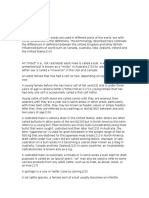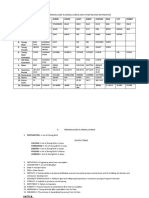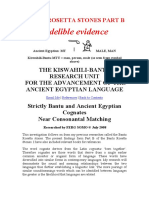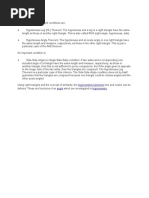Module 54
Uploaded by
RatulKumarMajumdarModule 54
Uploaded by
RatulKumarMajumdarEtymology
Cattle did not originate as the term for bovine animals. It was borrowed from Anglo-Norman
catel, itself from medieval Latin capitale 'principal sum of money, capital', itself derived in
turn from Latin caput 'head'. Cattle originally meant movable personal property, especially
livestock of any kind, as opposed to real property (the land, which also included wild or small
free-roaming animals such as chickens they were sold as part of the land).[10] The word is a
variant of chattel (a unit of personal property) and closely related to capital in the economic
sense.[11] The term replaced earlier Old English feoh 'cattle, property', which survives today as
fee (cf. German: Vieh, Dutch: vee, Gothic: faihu).
The word "cow" came via Anglo-Saxon c (plural c), from Common Indo-European gus
(genitive gows) = "a bovine animal", compare Persian gv, Sanskrit go-, Welsh buwch.[12]
The plural c became ki or kie in Middle English, and an additional plural ending was often
added, giving kine, kien, but also kies, kuin and others. This is the origin of the now archaic
English plural, "kine". The Scots language singular is coo or cou, and the plural is "kye".
In older English sources such as the King James Version of the Bible, "cattle" refers to
livestock, as opposed to "deer" which refers to wildlife. "Wild cattle" may refer to feral cattle
or to undomesticated species of the genus Bos. Today, when used without any other qualifier,
the modern meaning of "cattle" is usually restricted to domesticated bovines.[13
You might also like
- Animal Young Fem Ale Mal e Group Adjective Meat: Cub Sow Boar - Orycteropodi AnNo ratings yetAnimal Young Fem Ale Mal e Group Adjective Meat: Cub Sow Boar - Orycteropodi An40 pages
- For Other Uses, See Livestock (Disambiguation) .: Livestock Is Commonly Defined As Domesticated Animals Raised inNo ratings yetFor Other Uses, See Livestock (Disambiguation) .: Livestock Is Commonly Defined As Domesticated Animals Raised in10 pages
- "Cow" Redirects Here. For Other Uses, See - For Other Uses, SeeNo ratings yet"Cow" Redirects Here. For Other Uses, See - For Other Uses, See3 pages
- MANSION IMPROVE VOCABULARY 13 PIG OR PORKNo ratings yetMANSION IMPROVE VOCABULARY 13 PIG OR PORK7 pages
- Animal Terms: Animal Plural Male Female Young Collective Term (Terms of Venery)No ratings yetAnimal Terms: Animal Plural Male Female Young Collective Term (Terms of Venery)3 pages
- Animal, Their Economic Utility Terminology AppliedNo ratings yetAnimal, Their Economic Utility Terminology Applied71 pages
- The Clean Vegan Cookbook: 60 Whole-Food, Plant-Based Recipes to Nourish Your Body and Soul Jackie Akerberg - Instantly access the full ebook content in just a few seconds100% (1)The Clean Vegan Cookbook: 60 Whole-Food, Plant-Based Recipes to Nourish Your Body and Soul Jackie Akerberg - Instantly access the full ebook content in just a few seconds24 pages
- Elephant Elephants Are Large Mammals of The Family: TerminologyNo ratings yetElephant Elephants Are Large Mammals of The Family: Terminology13 pages
- Terminologies in Animal Science and Other Related Information100% (5)Terminologies in Animal Science and Other Related Information6 pages
- APdn 3 RUMINANT PRODUCTION TERMINOLOGIESNo ratings yetAPdn 3 RUMINANT PRODUCTION TERMINOLOGIES6 pages
- Vocabulary - Farm Animals and Related Name Nom Nombre Sound SonidoNo ratings yetVocabulary - Farm Animals and Related Name Nom Nombre Sound Sonido2 pages
- Farm Animals in North America Are Collectively Called LivestockNo ratings yetFarm Animals in North America Are Collectively Called Livestock6 pages
- Cattle: Cattle Cattle, or Cows, Are The Most Common Type of Large DomesticatedNo ratings yetCattle: Cattle Cattle, or Cows, Are The Most Common Type of Large Domesticated42 pages
- Zoonym Phraseological Units Expressing Human Characteristics in Uzbek, Tajik, Russian and German LanguagesNo ratings yetZoonym Phraseological Units Expressing Human Characteristics in Uzbek, Tajik, Russian and German Languages7 pages
- 41) Learners Document (Animals and Pets) 11 CompressedNo ratings yet41) Learners Document (Animals and Pets) 11 Compressed11 pages
- Introduction Anatomy and Physio and Animal BreedingNo ratings yetIntroduction Anatomy and Physio and Animal Breeding52 pages
- Holy Cow!: Doggerel, Catnaps, Scapegoats, Foxtrots, and Horse Feathers—Splendid Animal Words and PhrasesFrom EverandHoly Cow!: Doggerel, Catnaps, Scapegoats, Foxtrots, and Horse Feathers—Splendid Animal Words and PhrasesNo ratings yet
- Similarity and Congruence: Theorems If and Only IfNo ratings yetSimilarity and Congruence: Theorems If and Only If1 page
- Right Triangles: Pythagorean Theorem Right Triangle HypotenuseNo ratings yetRight Triangles: Pythagorean Theorem Right Triangle Hypotenuse1 page
- Trinil Tiger Trinil Java Beringia Japan SakhalinNo ratings yetTrinil Tiger Trinil Java Beringia Japan Sakhalin1 page
- Basic Facts: Dimensional Plane Figures Non-Planar Triangles Polytope EuclidNo ratings yetBasic Facts: Dimensional Plane Figures Non-Planar Triangles Polytope Euclid1 page
- Condition On The Sides: Triangle InequalityNo ratings yetCondition On The Sides: Triangle Inequality1 page
- Trigonometric Functions Angle TrigonometryNo ratings yetTrigonometric Functions Angle Trigonometry1 page
- Polygon Edges Vertices Shapes Geometry Euclidean Geometry Plane Euclidean SpaceNo ratings yetPolygon Edges Vertices Shapes Geometry Euclidean Geometry Plane Euclidean Space1 page
- Genetic Analysis Snow Leopard: Panthera ZdanskyiNo ratings yetGenetic Analysis Snow Leopard: Panthera Zdanskyi1 page
- Lifespan and Life Stages: Management Old BillyNo ratings yetLifespan and Life Stages: Management Old Billy1 page
- Charismatic Megafauna Mythology Folklore Flags Coats of Arms Mascots National Animal Bangladesh India Malaysia South KoreaNo ratings yetCharismatic Megafauna Mythology Folklore Flags Coats of Arms Mascots National Animal Bangladesh India Malaysia South Korea1 page
- Sense of Balance Fight-Or-Flight Response Mares Foal Saddle HarnessNo ratings yetSense of Balance Fight-Or-Flight Response Mares Foal Saddle Harness1 page
- European or "Taurine" Cattle Zebu Aurochs: Taurus Primigenius, Bos Taurus Indicus, and Bos Taurus TaurusNo ratings yetEuropean or "Taurine" Cattle Zebu Aurochs: Taurus Primigenius, Bos Taurus Indicus, and Bos Taurus Taurus2 pages
- Orphanage Adopting Hobart, Tasmania Self-HarmNo ratings yetOrphanage Adopting Hobart, Tasmania Self-Harm1 page
- European or "Taurine" Cattle Zebu Aurochs: Primigenius, The Primigenius, Bos Taurus Indicus, and Bos Taurus TaurusNo ratings yetEuropean or "Taurine" Cattle Zebu Aurochs: Primigenius, The Primigenius, Bos Taurus Indicus, and Bos Taurus Taurus1 page























































































